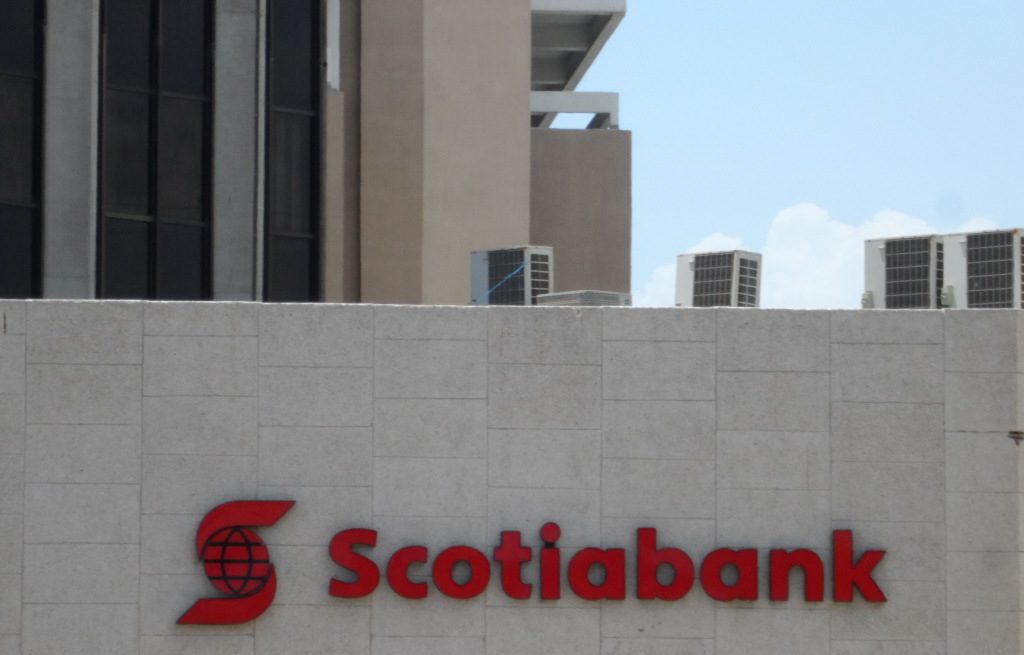Significant drop in provision for credit losses

Scotia Group has started to rebound from COVID-19, posting a big increase in net income for the fourth quarter, which went up by a whopping 125.6 per cent.
Scotia Group net income for the fourth quarter was $3.5 billion, up $1.9 billioncompared to the same period in 2019. This was primarily due to significantly lower Provisions for Credit Losses (PCL) of $2 billion.
In a news release, Scotia Group said the improved performance for the fourth quarter brings the net income for the year ended October 31, 2020 to $9.1 billion compared to $13.2 billion for the previous financial year. Excluding increased expected credit losses, as a result of the COVID-19 pandemic and a one-time restructuring provision, net income would be down $380 million or 2.4 per cent, due primarily to lower transaction volumes arising from the global pandemic.
Arising from the positive four quarter performance, the Board of Directors has approved a final dividend of 45 cents per stock unit, which is payable on January 20, 2021 to stockholders on record as at December 29, 2020. This dividend is 35 cents higher than the dividends paid in Q3 due to the improved performance of the Group in Q4.
Consequent to guidance issued by the Bank of Jamaica, the payment of dividends shall be made to shareholders that own less than one per cent of the Group’s shares. Commenting on the performance, outgoing Scotia Group President and CEO David Noel pointed to the performance in Q2 and Q3, which was undoubtedly affected by the significant economic downturn caused by the global COVID-19 pandemic.
PLEASED WITH STRONG PERFORMANCE IN Q4
According to Noel, “we are pleased with the strong business performance in Q4 with net profit being 125.6 per cent higher than in Q3 and $85.7 million or 2.5 per cent above our results in Q4 2019. While Retail and Commercial banking results would have been impacted by the PCLs, we continued to see strong growth with the commercial banking loan portfolio increasing by 21 per cent versus the prior fiscal year.”
“Over the past several quarters, we have seen a significant reduction in branch transactions which has been accelerated due to measures adopted to address the pandemic.”
David Noel, president and CEO, Scotiabank
The mortgage business, he said, also performed very well, with growth of 15 per cent year over year as customers continue to choose Scotiabank, as the financial partner to help them purchase a home. The group continues to make investments in its digital platforms and ABM network in order to provide customers convenient, affordable options to conduct their banking transactions.
“Over the past several quarters, we have seen a significant reduction in branch transactions which has been accelerated due to measures adopted to address the pandemic. In keeping with those trends, we have converted six branches to a digital operating model which focuses more on customer relationships and offering advice and solutions while facilitating cash transactions at ABMs,” Noel explained.
GROUP FINANCIAL PERFORMANCE
Total revenues excluding expected credit losses for the fourth quarter was $11.9 billion, up $1.6 billion or 14.9 per cent over the previous quarter based on improved performance in net fee and commission income and one off market making opportunities. Total revenues, excluding expected credit losses for the year ended October 31, 2020 was $44.0 billion and showed a reduction of $1.1 billion or 2.5 per cent when compared to 2019.
Despite strong loan growth across the various business lines, total revenues were heavily impacted by lower net fee and commission income given the decline in transaction volumes as a consequence of the COVID-19 pandemic, lower net gains on financial assets and lower interest earned on securities.

Net interest income after expected credit losses for the year was $19.0 billion, down $3.5 billion or 15.6 per cent when compared to the previous year. This was primarily attributable to the increase in expected credit losses of $3.2 billion given the revised assumptions incorporated in our impairment methodology as a result of the COVID-19 pandemic.
OTHER REVENUE
Other income, defined as all income other than interest income increased quarter over quarter by $1.62 billion or 39 per cent, while year over year other income decreased by $873 million or 4.4 per cent. Net fee and commission income amounted to $7.2 billion and showed a reduction of $946 million or 11.7 per cent.
The year-over-year decline noted in fee and commission revenues was primarily attributable to lower transaction volumes. This lower volume stems from the COVID-19 pandemic in conjunction with the continued execution of the Group’s digital adoption strategy geared towards educating customers about the various electronic channels which attract lower fees.
Insurance revenues increased quarter over quarter by $71.8 million or 13.9 per cent due to an upward trend in the number of new policies compared to Q3. Year-over-year insurance revenues declined by $293 million or 8.9 per cent to $3.0-billion due to the reduction in premium income which was partially offset by higher actuarial reserve releases.
Net gains on foreign currency activities and financial assets amounted to $7.8 billion, showing a reduction of $644 million or 7.6 per cent below prior year due to lower revaluation gains and lower trading activities as a consequence of the pandemic.
Other revenue increased by $1.0 billion or 457.2 per cent year over year and by $1.2 billion (over 100 per cent) quarter over quarter and was attributable to gains realised on the extinguishment of debt facilities.
CREDIT QUALITY
Expected credit losses for the year showed an increase of $3.2 billion when compared to 2019. This was mainly driven by additional provisions based on revised assumptions incorporated in the impairment methodology given the COVID-19 pandemic.
Despite the increase in provisions, credit quality remains strong. Noel was quick to point out, “we are well provisioned with accumulated credit losses (ACLs) for both performing and non-performing loans, and ensuring significant coverage for possible future net write offs. The quality of our portfolio remains strong and continues to be more favourable than the industry average lower non-accrual loans to gross loans and higher loan loss provisions to gross loans.”







Comments